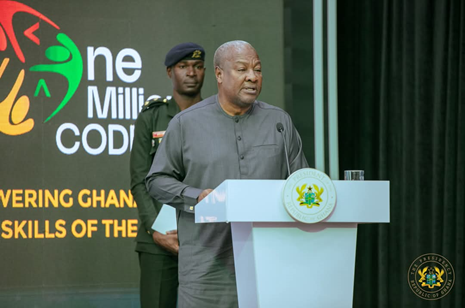
Audio By Carbonatix
On April 16, 2025, Ghana officially launched the One Million Coders Programme, an initiative aimed at equipping one million young Ghanaians with essential digital skills to enhance their employability and position them for opportunities in the global digital economy. The event, held in Accra, was launched by President John Dramani Mahama and the Minister for Communication, Digital Technology and Innovations, Hon. Sam Nartey George.
The Minister indicated in his speech that while the initial plan was to enrol just 260 students for the pilot, 4,000 applications were received within the first four hours of launching the portal, prompting the team to adopt a double-track system and increase enrollment to 520 trainees. The application number has since grown, with total applications standing at 91,847 at the time of the launch.
In his speech, the President referenced countries like Estonia, the UK, Finland, Japan, and the US, all of which have successfully implemented digital education programs to drive innovation. This article explores these initiatives and identifies key lessons for Ghana’s One Million Coders programme to ensure it has a lasting, transformative impact.
Estonia: The ProgeTiger Program
The ProgeTiger Program is a national initiative in Estonia aimed at improving technological literacy and digital competence among students and teachers. The program targets learners from preschool to high school and integrates programming, robotics, and 3D technology into the curriculum while offering comprehensive teacher training to support its delivery.
Students develop critical thinking, collaboration, and problem-solving skills through coding workshops, robotics competitions, and creative digital projects.
Ninety-nine percent (99%) of Estonian kindergartens and schools have actively participated in the program, making it a key driver of Estonia’s digitally forward education system.
Building on this success, Estonia is set to launch the AI Leap 2025 programme in September 2025, which will provide students and teachers with access to AI-powered educational tools and training to mark the next phase in integrating advanced technologies into education.
United Kingdom: Year of Code
In 2014, the UK launched the "Year of Code”, a nationwide campaign to embed coding into the national curriculum for all state-run primary and secondary schools. The initiative was backed by a £500,000 teacher training fund and aimed to equip students with vital digital skills and spark interest in computer science.
It emphasised hands-on learning and teacher empowerment through partnerships with industry experts and universities. The initiative was designed to prepare a future workforce skilled in digital technologies to drive economic growth and innovation in the UK. This move positioned the UK as a pioneer in digital education, with long-term impacts still evident in its tech ecosystem.
Finland: National Coding Initiative
In 2016, Finland integrated coding into its national core curriculum to make programming a key component of subjects like mathematics and crafts rather than a standalone subject.
Led by the Finnish National Agency for Education, the initiative aimed to build digital literacy and computational thinking from an early age. Age-appropriate programming concepts and tools were introduced at different grade levels to ensure progressive learning across the education system.
A tutor-teacher model was implemented in each school to support colleagues, alongside online resources like MOOCs and digital libraries. The inclusive curriculum design involved collaboration with educators, researchers, and other stakeholders to enable a smooth and sustainable rollout.
Japan: Programming in Schools
In 2020, Japan introduced mandatory programming education in elementary schools to increase digital literacy and promote computational thinking. This initiative, led by the Ministry of Education, expanded to junior high schools in 2021 and high schools in 2022.
The focus is on developing students' logical reasoning and "programming thinking skills" rather than simply teaching coding languages. Students aren’t just learning how to code; they’re learning how to use tech to solve real problems.
Think robotics in schools, tech-enabled agriculture projects, and student-led innovation labs. With increased access to computers and digital tools in schools, the program has sparked growing interest in engineering and tech-related careers among young learners.
United States – CSforAll
Computer Science for All (CSforAll) is a 2016 initiative aimed at making computer science education accessible to every student, especially underrepresented groups. It’s a nationwide effort with many contributing organisations and a focus on preparing teachers, expanding Computer Science courses, and creating sustainable local solutions.
CSforAll promotes collaboration between schools, districts, nonprofits, and industry partners and uses data to guide its strategies. This initiative has paved the way for significant growth in Computer Science education and left an impact on both policy and practice across the U.S.
What Ghana Can Learn from These Initiatives
With the One Million Coders initiative now underway, Ghana has a unique opportunity to design a program that is both ambitious and sustainable. Drawing from the lessons of global success stories, here’s what Ghana can take away:
1. Make It Locally Relevant
We can’t simply adopt foreign curricula without consideration for our local context. Ghana must design a curriculum that speaks to our industries and opportunities. This ensures that the skills students learn directly translate to employment opportunities.
2. Bring the Private Sector On Board
Government action is essential, but it must be supported by private sector involvement. Estonia, the UK, the US and Finland all integrated tech companies into their programs to provide mentorship, curriculum development, resources and post-training linkages. Ghana’s growing digital ecosystem, from local startups to multinational tech firms can play a similar role. Whether it’s offering internships, co-developing content, or supporting implementation, the private sector (both local and international) must see this as an investment in the future workforce.
3. Prioritize Creativity, Not Just Coding
While technical skills like coding are key, creativity, problem-solving, design thinking, and teamwork are equally important. Japan and Finland’s approach reminds us that the future belongs to creators, innovators, and problem-solvers, not just technicians. We should promote a mindset and environment where students are encouraged to think outside the box.
4. Invest in Trainers, Not Just Infrastructure
Infrastructure alone won’t make a program successful. Ghana must focus on empowering educators. Finland and the UK show us that regular, hands-on teacher training is critical. Our trainers need ongoing support and training to confidently guide the next generation of coders.
5. Close the Access Gap
Equitable access to learning resources is a must. Just like CSforAll in the U.S., Ghana needs to ensure that the youth in rural areas aren’t left behind. Urban coding labs are a start, but mobile learning units and community hubs can ensure that underserved communities and minorities have the same opportunities to learn and grow in digital skills.
Ghana’s One Million Coders initiative is an exciting opportunity to shift the narrative. But to make it work, we need thoughtful implementation rooted in global lessons and local realities.
About the author:
Doreen Aglago-Cofie is a Digital Transformation and Innovation Policy professional supporting public actors on development topics towards the advancement of the Ghanaian Digital sector. Her work focuses on the intersection between Digital transformation and Policy and has supported the implementation of several projects in the space.
Connect via LinkedIn: https://www.linkedin.com/in/doreencofie/

Latest Stories
-
Kpasec 2003 Year Group hosts garden party to rekindle bonds and inspire legacy giving
38 minutes -
Financing barriers slowing microgrid expansion in Ghana -Energy Minister
46 minutes -
Ghana’s Ambassador to Italy Mona Quartey presents Letters of Credence to Pres. Mattarella
60 minutes -
KOSA 2003 Year Group unveils GH¢10m classroom project at fundraising event
1 hour -
Woman found dead at Dzodze
3 hours -
Bridging Blight and Opportunity: Mark Tettey Ayumu’s role in Baltimore’s vacant property revival and workforce innovation
3 hours -
Court blocks Blue Gold move as investors fight alleged plot to strip shareholder rights
3 hours -
Nana Aba Anamoah rates Mahama’s performance
4 hours -
Ghana selects Bryant University as World Cup base camp
5 hours -
Nana Aba Anamoah names Doreen Andoh and Kwasi Twum as her dream interviewees
5 hours -
Religious Affairs Minister urges Christians to embrace charity and humility as Lent begins
6 hours -
Religious Affairs Minister calls for unity as Ramadan begins
6 hours -
Willie Colón, trombonist who pioneered salsa music, dies aged 75
7 hours -
Ga Mantse discharged from UGMC following Oti Region accident
7 hours -
Guardiola tells team to chill with cocktails as Man City pile pressure on Arsenal
7 hours

